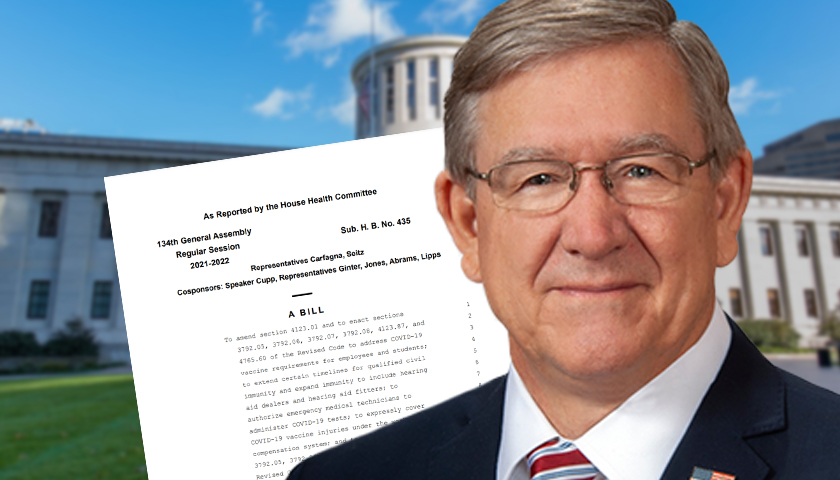By J.D. Davidson
An Ohio bill that would give most Ohio workers and students the ability to refuse COVID-19 vaccination mandates was poised to pass the House on Wednesday before Republicans sent it back to the House Rules and Reference Committee.
House Bill 435, The Vaccine Fairness Act, would stop any entity from mandating a COVID-19 vaccine that has not been fully approved by the U.S. Food and Drug Administration and would prohibit government-ordered vaccine passports.
“We’ve had a lot of very good, very productive conversations on House Bill 435. There are a few additional issues our members would like more time to explore,” House Speaker Bob Cupp, R-Lima, said. “I think it’s important that we have a consensus within our caucus on how we move forward, so we’re going to take time to do that.”
The bill allows people vaccine exemptions with proof of a negative medical reaction, religious reasons or for reasons of conscience. It covers private- and public-sector employees, as well as students at public and private schools, colleges and universities.
The bill still would allow a private business to require proof of vaccine or a negative test of customers and does not apply to those working at a children’s hospital, in a critical care or intensive care unit, those covered by a collective bargaining agreement or employees hired after the effective date.
If passed by both the House and Senate and signed by Gov. Mike DeWine, it wouldn’t take effect for three months after his signature.
“This bill balances personal medical freedom and protecting the health and safety of Ohioans,” Rep. Rick Carfagna, R-Genoa Township, said. “It empowers Ohioans by ensuring the availability of COVID-19 vaccine mandate exemptions without compromising the ability to protect the public health.”
The Ohio State University, several other private and state colleges and universities, many hospitals and other employers across the state have required vaccines or proof of negative tests of students and employees.
Carfagna and Rep. Bill Seitz, R-Green Township, introduced HB 435 on Monday. In a nearly two-hour hearing Tuesday, testimony from Carfagna and Seitz was the only testimony heard.
Rep. Allison Russo, D-Upper Arlington, objected to the committee vote, calling one hearing with no testimony a bad way to make public policy.
“Like many members of this committee, I didn’t actually see the language of this bill before five minutes before we started, so claims that we spent hours debating this legislation is not correct,” Russo said during Tuesday’s hearing. “This is a very different bill than what we have been spending a lot of time debating in this committee over several weeks.”
Seitz said no other interested parties saw the bill before members of the committee, but the Ohio Business Roundtable, the Ohio Chamber of Commerce and the Ohio Hospital Association were involved in discussions. He also said he assumed the Ohio Hospital Association represented the entire medical community.
The Senate Health Committee met Wednesday morning, but the bill was not on its agenda.
– – –
J.D. Davidson is a veteran journalist with more than 30 years of experience in newspapers in Ohio, Georgia, Alabama and Texas. He has served as a reporter, editor, managing editor and publisher. He is a regional editor for The Center Square.








